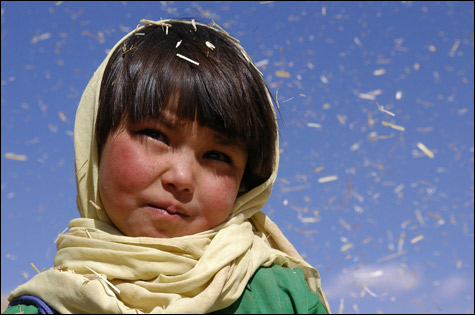
BUDDHA COLLAPSED OUT OF SHAME: Like Abbas Kiarostami, Hana Makhmalbaf focuses on children. |
| “The Boston Festival Of Films From Iran” | Museum of Fine Arts | November 7-30 |
Everyone in Tehran is down-and-out or taking dope or getting divorced — or all three. Or so this year's Festival of Films from Iran at the Museum of Fine Arts would suggest. Previous festivals have touched on the discontents of the big city before, but now Western-style anomie and other ills appear to have become a universal malaise. Likewise, Western styles of moviemaking have made an impact. Fewer filmmakers imitate the studied, long takes of such Iranian New Wave filmmakers as Abbas Kiarostami; instead, they opt for recognizable American genres rendered fresh (or absurd) by indigenous Iranian elements.Leaning to the absurd side is the broad comedy Ali Atshani's Banana Skin (2008; November 21 at 6:15 pm), in which a workaholic stockbroker finds his busy schedule interrupted by death. Overlook the subtitles and Tehran trappings and it's like a play-by-play reprise of Ghost Town. This bizarre cultural disorientation alone makes the film worth watching.

More on the fresh side is veteran director Dariush Mehrjui's Santoori: The Music Man (2007; November 14 at 7:45 pm, with Mehrjui receiving the Ilex Award for Lifetime Achievement), which recalls Walk the Line with a junkie Iranian dulcimer player instead of a pill-popping American country-music legend. Ali (an intense, bearded Bahram Radan) transfixes Tehran audiences with his mournful, self-pitying ballads and the flurry of his tiny hammers playing the title instrument. Among those who fall under his spell is his beautiful wife, Hanieh (Golshifta Farahani). But Ali loves the santoor more than anything else — or is heroin his real heart's desire? Before she hits the road, Hanieh condemns her homeland, a country whose hypocrisy, corruption, and cruelty (Ali's family disowned him because of his love of music) drives its greatest artists to drug addiction. Ali's subsequent downward spiral is one of the most harrowing and moving depictions of despair to be seen on screen.
As is the bottoming out of the hero of Behnam Behzadi's Before the Burial (2008; November 15 at 3 pm). Siamak (a bearded, intense Alireza Aqakhani), a dissident recently released from prison, leaves his bus-driving job with a mission: before his birthday, which takes place in a few days, he'll avenge himself on those who turned him in years ago, when he was a medical student, and then kill himself. But a kooky young girl interrupts his vendetta, charming him with her tales of being the princess of a remote island. The relationship is quirky and oddly erotic, and before it can descend into the maudlin, it takes a haunting, near-mystical turn.
Romantic fantasy and disenfranchisement also trouble Saman Salur's Lonely Tune of Tehran (2008; November 23 at 7:20 pm). A mismatched pair of backwoods misfits — the towering, slow-witted Behrouz (Behrouz Jalili), who claims to be a shell-shocked war vet, and Hamid (Hamid Habibifar), a tiny deformed braggart — make a wretched living setting up illegal satellite dishes. Like Lennie and George in Of Mice and Men, the pair support each other with their mutual fantasies — mostly imaginary love affairs with beautiful women — as their living circumstances grow increasingly awful. Very strange, funny, and poignant.
So is Majid Majidi's The Song of Sparrows (2008; November 7 at 7:45 pm, with Majidi receiving the Ilex Award for Excellence in Filmmaking). The image of Karim (Mohammad Amir Naji), a worker at an Iranian ostrich farm, scouring the desert landscape with a fake tail and long-necked head in search of a missing fowl is just one of the film's surreal moments. Despite his efforts, Karim gets canned, so he heads to Tehran on his motorbike to find work. Through various misadventures, he lands a job as a deliveryman, and that leads to another strange image — an army of men on tiny bikes carrying huge boxes of appliances like leaf-cutter ants despoiling a forest. As you'd imagine, Karim's country simplicity and traditional values deteriorate when exposed to the cutthroat self-interest and materialism of the big city. Can his loyal wife and long-suffering children restore him to the roost?
This country-city dichotomy returns in Mehrshad Karkhani's Loose Rope (2008; November 29 at 4 pm). Instead of satellite dishes or ostriches, the two country bumpkins in this affecting comic allegory wrangle more-traditional livestock, hauling sheep and cattle to the Tehran market in their beat-up pick-up truck. Their boss puts in a special request for a steer for sacrifice, and the two undergo various mishaps en route to delivery, encounters that are unexpected and not fully explained but in the end make clear their identification with the sad-eyed doomed animal. (The film opens with a claim that no animal was injured during the making of this movie. It's hard to credit.)